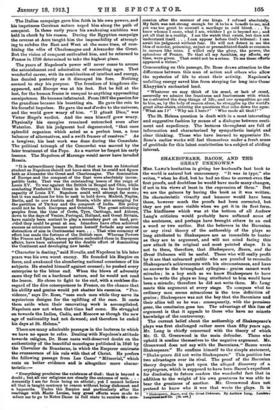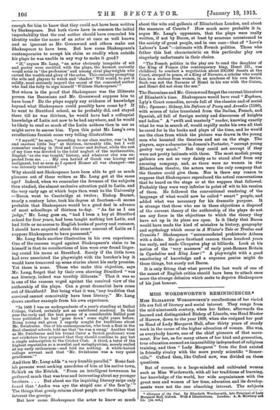SHAKESPEARE, BACON, AND THE GREAT UNKNOWN.*
MRS. LANG'S hesitation in giving her husband's last book to the world is natural but unnecessary. "II was in type," she writes, "when he died, but he had no time to correct even the first proofs, and doubtless he would have made many changes, if not in his views at least in the expression of them." But we are the gainers by having the book as it was written. Its characteristic vivacity and humour would have been there, however much the proofs had been corrected, but they are yet more visible when we get it in its first form. The kindliness which was at the bottom of all Andrew Lang's criticism would probably have softened some of the sentences, and perhaps have brought others to an end a word or two earlier. But the believers in the Baconian or any rival theory of the authorship of the plays so long attributed to Shakespeare are as insensible to banter as they are to argument, and will not mind facing this new attack in its original and most pointed shape. It is not to them, therefore, that Shakespeare, Bacon, and the Great Unknown will be useful. Those who will really profit by it are that unlearned public who are puzzled to reconcile Shakespeare's achievements with his circumstances, and have no answer to the triumphant syllogism : genius cannot work miracles ; in a boy such as we know Shakespeare to have been to write the playa so long attributed to him would have been a miracle; therefore he did not write them. Mr. Lang meets this argument at every stage. To compass what to ordinary men seems miraculous is the true definition of genius ; Shakespeare was not the boy that the Baconiane and their allies tell us he was : consequently, with the premises gone, the conclusion goes too. The advantage of this line of argument is that it appeals to those who have no minute knowledge of the controversy.
The current belief about the authorship of Shakespeare's plays was first challenged rather more than fifty years ago. Mr. Lang is chiefly concerned with the theory of which Mr. G. G. Greenwood is the main defender. Those who uphold it. confine themselves to the negative argument. Mr. Greenwood does not say with the Baconians," Bacon wrote Shakespeare." He confines himself to the simple statement, " Shale ;peare did not write Shakespeare." This position has two advantages over its rival. The proof of the Baconian theory depends in part upon the alleged discovery of a cryptogram, which is supposed to have been Bacon's expedient for disclosing to future readers the wonderful fact that in addition to the weight of his own greatness be was able to bear the greatness of another. Mr. Greenwood does not pretend to know who it was that wrote the plays. It is
enough for him to know that they could not have been written by Shakespeare. But both views have in common the initial improbability that the real author should have concealed his identity under the name of an actor at once as well known and so ignorant as Mr. Greenwood and others make out Shakespeare to have been. But how came Shakespeare's contemporaries to accept his claim so readily when outside his plays he was unable in any way to make it good ?
"If," argues Mr. Lang, "an actor obviously incapable of wit and poetry were credited with the plays, the keenest curiosity would arise in the profession' and among rival playwrights who envied the wealth and glory of the actor. This curiosity prompting the wits and players to watch and 'shadow' Will would, to put it mildly, most seriously imperil the secret of the concealed author who had the folly to sign himself' William Shakespeare.'"
But where is the proof that Shakespeare was the illiterate person the Baconians and Mr. Greenwood suppose him to have been ? Do the plays supply any evidence of knowledge beyond what Shakespeare could possibly have come by P If he went to Stratford school, as he probably did, and stayed there till he was thirteen, he would have had a colloquial knowledge of Latin not now to be had anywhere, and he would be likely to read so much of the Latin authors then in use as might serve to amuse him. Upon this point Mr. Lang's own recollections furnish some very telling illustrations.
"I myself," he says, "according to my class master, was a bad and careless little boy' at thirteen, incurably idle, but I well remember reading in Ovid and Caesar and Sallust, while the rest of my time was devoted to the total neglect of the mathematics, English as she was taught,' history, and whatever else was expected from me. . . . My own hatred of Greek was hissing and malignant, but as soon as I opened Homer all was changed—one was intensely interested."
Why should not Shakespeare have been able to get as much pleasure out of these writers as Mr. Lang got at the same age? Indeed, when we remember the fewness of the subjects then studied, the almost exclusive attention paid to Latin, and the very early age at which boys then went to the University —Bacon went to Cambridge at twelve; Bishop Burnet, nearly a century later, took his degree at fourteen—it seems probable that Shakespeare would be a good deal in advance of most schoolboys of thirteen to-day. "As far as I can judge," Mr. Lang goes on, "had I been a boy at Stratford school for four years, had been taught nothing but Latin, and had little or no access to English books of poetry and romance, I should have acquired about the same amount of Latin as I suppose Shakespeare to have possessed."
Mr. Lang finds another illustration in his own experience.
One of the reasons urged against Shakespeare's claim to be himself is that no recollections of him were ever found lingering round his name at Stratford. Surely if the little town had ever associated the playwright with the butcher's boy it would have treasured up some stories about his early promise. Yet there is none. Those who make this objection, says Mr. Lang, forget that by their own showing Stratford "wan not literary, indeed was terribly illiterate." That it was so is one of the reasons urged against the received view of the authorship of the plays. Can a great dramatist have come out of Stratford? But being what it was, "any tradition that survived cannot conceivably have been literary." Mr. Lang draws another example from his own experience.
"In 1866 I was an undergraduate of a year's standing at Balliol College, Oxford, certainly not an unlettered academy. In that year the early and the best poems of a considerable Balliol poet were published : he had gone down' some eight years before. Being young and green I eagerly sought for traditions about Mr. Swinburne. One of his contemporaries, who took a first in the final classical schools, told me that 'he was a smug.' Another that as Mr. Swinburne and his friend (later a Scotch professor) were not cricketers they proposed that they should combine to pay but a single subseription to the Cricket Club. A third, a tutor of the highest reputation as a moralist and metaphysician, merely smiled at my early enthusiasm—and told me nothing. A white-haired college servant said that 'Mr. Swinburne was a very quiet gentleman."
And then Mr. Lang adds "a very humble parallel." Some foolish persons went seeking anecdotes of him at his native town, Selkirk on the Ettrick. "From an intelligent townsman he gathered much that was true and interesting about my younger brothers. . . . But about me the inquiring literary snipe only heard that Andra was aye the stupid ane o' the fanfly.' " The things that gossip retains about people are the things that interest the gossips.
But how came Shakespeare the actor to know so much about the wits and gallants of Elizabethan London, and about the manners of Courts P How much more probable it is, argue Mr. Lang's opponents, that the plays were really written, if not by Bacon, at least by someone accustomed to the society of great people, and in one case—that of "Love's Labour's Lost "—intimate with French politics. Those who father this last characteristic on this particular play are singularly unfortunate in their choice.
"The French politics in the play are to send the daughter of the King of France (the contemporary king, Henri III., was childless) to conduct a negotiation about 200,000 ducats at the Court, steeped in peace, of a King of Navarre, a scholar who would fain be a recluse from women, in an academe of his own device. Such was not the Navarre of Henri in his war with the Guises, and Henri did not shun the sex."
The Baconians and Mr. Greenwood forget the current literature of Elizabeth's time. Shakespeare would have read "Eziphues, Lyly's Court comedies, novels full of the classics and of social life ; Spenser; Sidney, his Defence of Poesy and Arcadia (1590), with scores of tales translated from the Italian, French, and
Spanish, all full of foreign society and discourses of knights and ladies." A "swift and masterly" reader, knowing exactly what he was in search of, would rapidly make his own all that he cared for in the books and plays of the time, and he would see the class from which the picture was drawn in the young
men who haunted the theatres and sat on the stage. The players, says a character in Jonson's Poetaster, "corrupt young
gentry very much." But they could not corrupt if they were not pretty intimate with them. The most modish young gallants are not so very dainty as to stand aloof from any amusing company, and, as there were no women in the Elizabethan theatre, the actors were the only company that the theatre could give them. Nor is there any reason to suppose that Shakespeare reproduced the actual conversations that he heard on the stage or at the suppers that followed. Probably they were very inferior in point of wit to his version of them. He followed the conventional rendering of the language of what would now be called" smart" people, and added what was necessary for his dramatic purpose. It is strange that those who see in these objections a disproof of the current theory of the authorship of the plays do not see any force in the objections to which the theory they have set up in its place are open. Is it likely that Bacon would have made the kind of mistakes in history, geography and mythology which occur in A Winter's Tale or Troilus and Cressida ? Shakespeare "accommodated prehistoric Athens with a duke. He gave Scotland cannon three hundred years too early, and made Cleopatra play at billiards. Look at his notion of the 'very manners' of early post-Roman Britain in Cyrabeline and King Lear !" A playwright with a good smattering of knowledge and a supreme genius might do these things, but surely not Bacon.
It is only fitting that what proved the last work of one of the sanest of English critics should have been to attack once more the strange delusion which seeks to deprive Shakespeare of his just honour.







































 Previous page
Previous page